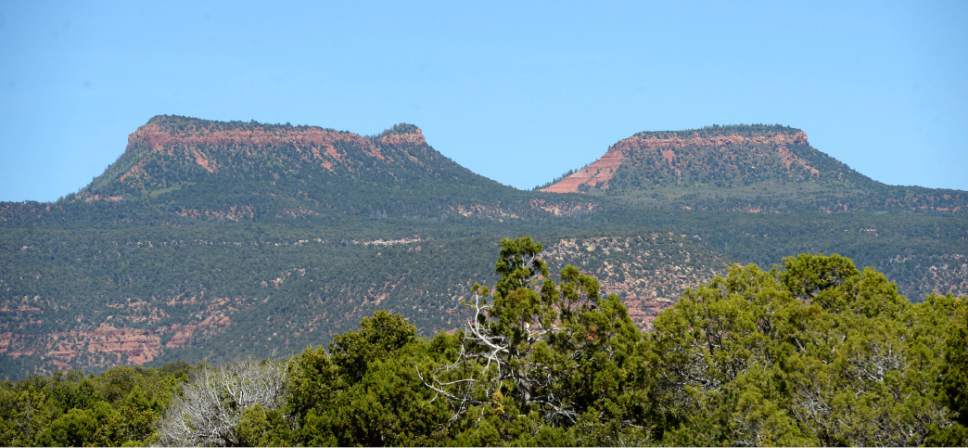This is an archived article that was published on sltrib.com in 2016, and information in the article may be outdated. It is provided only for personal research purposes and may not be reprinted.
Washington • Congress still has time to pass legislation to preserve parts of the Bears Ears region in southeastern Utah — and halt a national monument designation — before year's end, one of the sponsors said Wednesday.
"We're moving at a record pace for Congress," Rep. Jason Chaffetz, R-Utah, said as a House Natural Resources subcommittee took up the bill. "We'll be back in November and December, and there's lots of legislation that will move at that time."
The Public Lands Initiative (PLI), sponsored by Chaffetz and Rep. Rob Bishop, who heads the Natural Resources Committee, would preserve 4.6 million acres of federal land as conservation areas, open more than 1.1 million acres for recreation and mineral development, consolidate more than 300,000 acres of state lands and expand Arches National Park by nearly 20,000 acres.
The proposal, which has earned a strong rebuke from environmental groups and opposition from federal agencies, is aimed at stopping President Barack Obama from using his unilateral power to name a national monument to protect some 1.8 million acres of federal land as some tribal leaders and conservationists have requested.
But time is running out.
Congress has only a few weeks left before adjourning so its members can campaign for re-election. And the PLI has yet to receive a full committee hearing, let alone votes in the House or Senate.
Democrats say the PLI is more of a distraction than an actual solution.
"This is not a legislative proposal that is going to be passed by the Senate or signed by the president," said Rep. Niki Tsongas, D-Mass., adding, "It could be said that this is a wolf in sheep's clothing."
Rep. Raul Grijalva, D-Ariz., and the top Democrat on the committee, praised the concept of the PLI, bringing groups together to negotiate public land policy, but said the resulting legislation "tilts the scale dramatically" in favor of development and motorized-vehicle access.
"Unfortunately," Grijalva said, "this bill that resulted from this process is a nonstarter."
In Wednesday's hearing, officials from the Bureau of Land Management and the U.S. Forest Service said they applauded the effort to create a consensus bill but noted they opposed the legislation as written because it didn't strike that balance.
BLM Director Neil Kornze said the measure "undermines" the agency's authority to protect the region.
Republicans on the subcommittee pushed back against PLI foes, at one point questioning a monument supporter about her non-Utah residence.
Rep. Tom McClintock, R-Calif., and chairman of the public lands subcommittee, said a monument designation, should it happen, would be aimed only at appeasing "out of state interests."
"I'm not sure who[m] President Obama thinks he's accountable to," McClintock said, "but, here in Congress, we think it's our constituents."
San Juan County Commissioner Rebecca Benally, a Navajo and PLI proponent, said the federal government has long bullied Native Americans, and now environmentalists and "their corporate benefactors" are doing so.
"The Bears Ears National Monument campaign is a cynical political stunt that, if successful, will deny grass-roots Utah Navajos access to their sacred and spiritual grounds," Benally testified.
Bishop noted more than 1,200 meetings on the bill as well as discussion with all sides of the public lands debate to come up with the legislation and said it was a much more collaborative effort than any presidential designation.
"This is not the hearing; it is a hearing," Bishop said. "We've had meetings for five years on this bill."
During the discussion, Chaffetz said it was wrong for outside interests to push for land-management decisions in someone else's backyard.
"That's not the way it should be," Chaffetz said. "It's arrogant, it's offensive, and it shouldn't be tolerated by this Congress."
The Western Values Project said in a report Wednesday that Bishop's legislative record shows he cannot pass complex bills in such a short time span. On average, the group said, Bishop has passed about one bill per year and only six bills during his 14-year tenure have passed in less than six months, including one naming a post office and another transferring a few acres. The bills also included emergency funds after Hurricane Sandy and to address Puerto Rico's debt crisis.
The PLI is 215 pages and isn't simple in the slightest, the group said.
"It is infinitely more complicated than naming post offices, transferring small amounts of lands to local control, or passing urgently needed emergency funding to address natural disasters or financial crises," Western Values Project said in the report.
Bishop says there's plenty of time left.
"There is a helluva long lame-duck session," he said in an interview. "We're going to be here from after the election to Christmas."
He said he doesn't know if movement on the PLI will stop the president from acting on a monument but that the White House would be hard-pressed to explain why it made such a move against a locally driven process.
Bishop said: "It's going to be very difficult to make this monument unless it's simply, 'Screw you, Utah, in your face.' "



